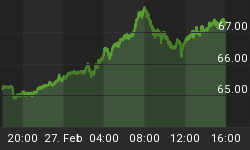All the expectations for resurgent growth are running into a time problem. While the Federal Reserve continues to pump the system, hoping for that burst of energy coming out of the slump, there is really little reason to expect anything more than we have already gotten. I've written recently about that in the context of payroll growth and the rate of improvement in the unemployment rate. But there is also, as I say, a time problem.
The current expansion, believe it or not, is getting long in the tooth. While there have been longer expansions - the one from 1991 to 2001, fueled by a continuous decline in interest rates, a budget that was near balance or in surplus, and an asset bubble engendered by the promise of the Internet and some remarkable Wall Street pitchmen - the average postwar expansion has only been 68 months, peak to peak, or 58 months, trough to peak. According to the NBER, on which we rely to jog our memories since this was so long ago, the prior business cycle peak occurred in December 2007 and the prior trough in June 2009. So, using those average business cycle lengths, the expected date of the subsequent peak would be between August 2013 and May 2014. This latter date is especially interesting because it is approximately the current consensus on when the QE taper is expected to begin (again).
I think it's not unreasonable to suggest that getting more than an "average" expansion in the current circumstance would be a pleasant surprise indeed. With the size of government deficits, the uncertainty engendered by the morass in Congress and the rapid proliferation of regulatory overhead (both ACA-related and other), real interest rates much closer to the likely bottom than to the likely top, and continued threat of volatility in the international political economy... it is remarkable to me that we've even been able to squeeze out one of "average" duration.
And all it took was a few trillions!
It is well past time when it was appropriate for the Federal Reserve to stop trying to push the economy faster. Blowing into the sail simply doesn't work very well to make the boat go faster. It will only lead to hyperventilation.
So now we are in a situation in which the expansion is likely to begin to wind down, and very likely to do so at least partly provoked by the Fed's tightening of policy (for lessening QE is, as we have seen from the interest rate response, clearly a tightening of policy). It may become very tempting for the Yellen Fed to continue QE as weakness manifests, but the problem is going to be that inflation is going to be heading higher, not lower, into the slowdown as the housing price inflation continues to percolate into rental prices and a weakening dollar helps other prices to firm as well.
We really are in a very dangerous situation equity market-wise, as a result of this timing issue. Over the next year inflation is going to rise, growth is (probably) going to slow, and equity earnings ex-finance are looking decidedly punk as a recent article by Sheraz Mian from Zacks Investment Research pointed out. Which is not to say, of course, that the stock market can't or won't continue to ramp higher...just that it is increasingly subject to sudden-breakage risk as the shelf it sits on gets higher and higher.
You can follow me @inflation_guy!
Enduring Investments is a registered investment adviser that specializes in solving inflation-related problems. Fill out the contact form at http://www.EnduringInvestments.com/contact and we will send you our latest Quarterly Inflation Outlook. And if you make sure to put your physical mailing address in the "comment" section of the contact form, we will also send you a copy of Michael Ashton's book "Maestro, My Ass!"















